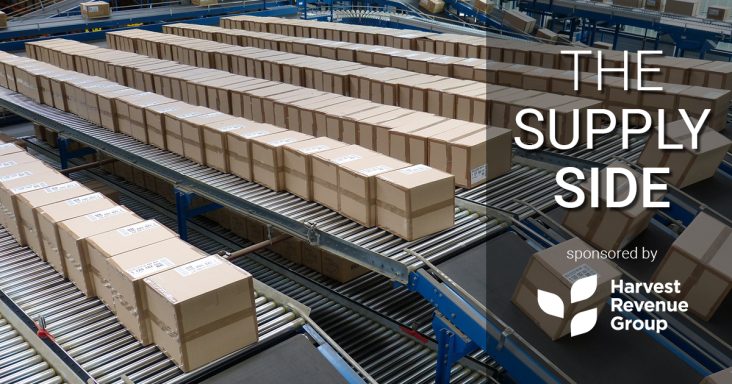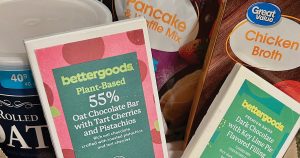The Supply Side: Private brands continue to grow retail market share in 2024
by January 7, 2025 11:58 am 2,165 views

Private brands, like Walmart’s Great Value, see continued growth in many categories. According to new data from Numerator, 99.9% of consumers purchased a private-label grocery item in the past 12 months.
The report also showed that 99.2% purchased private brand health/beauty products and 98.9% bought private brands for household products.
Private label products accounted for 24% of total sales across 10 major product sectors in the past 12 months. General merchandise categories such as office, home and garden, and tools and home improvement had the largest private label share, ranging from 37.8% to 27% of category sales. Private brand grocery sales eclipsed 24.4% of total sales behind Walmart’s Bettergoods product launch in May.
Numerator reports Bettergoods and Target’s Dealworthy brands are the fastest-growing of the year, each increasing sales volume by 200%. Those brands are followed by Bullseyes Playground at Target, up 109%, Choceur at Aldi, up 83%, and B Pure at Dollar Tree, up 74% over the past 12 months.
Among the nation’s largest retailers, discounters Aldi and its parent Trader Joe’s most heavily rely on private brand sales accounting for 80% and 70%, respectively, of their total sales. Costco’s Kirkland brand contributes 35% of company sales. Member’s Mark at Sam’s Club has grown to 34% of the company’s total sales worth more than $27 billion last year.

The reason for the continued growth in private brand sales is directly related to consumers seeking value amid inflationary prices, according to Numerator data that found six out of 10 consumers think private brands offer an above-average value for their price. Four in 10 say they buy private brands to save money, and 27% consider private brands are as good as name brands.
BETTERGOODS
Retail Touch Point reports that Walmart’s Bettergoods brand addresses consumers’ perceived value, which often mixes price and quality. Focused on making quality food available, many Bettergoods products cost less than $5. The brand is attracting higher-income household shoppers and Gen Z shoppers (ages 12 to 27) who seek better quality in dairy, canned goods and condiments.
Bettergoods launched in June and continues to roll out new products across the grocery segment from frozen foods to dairy and soups, and salty snacks.
“Walmart’s Bettergoods strategy emphasizes the importance of uncovering customers’ key motivations, with in-depth analyses both within the four walls of your store and beyond. A 360-degree look at performance in the competitive landscape and adjacent categories elevates customer-driven strategies, empowering retailers to more effectively reach their customers and drive awareness, sales and loyalty,” noted Michael Della Penna, chief strategy officer at InMarket.
Bettergoods was Walmart’s first major private brand launch in 20 years and adds to the retail giant’s history of private brand success with Great Value being purchased by 86% of U.S. households last year. Equate was purchased by 74% of households and fresh foods Marketside by 69% of households.
Walmart Chief Financial Officer John David Rainey said more than half of all grocery baskets in the past year contained a private brand which made the launch of Bettergoods timely.
“Today’s customers expect more from the private brands they purchase — they want affordable, quality products to elevate their overall food experience. The launch of Bettergoods delivers on that customer need in a meaningful way,” said Scott Morris, Walmart senior vice president, of private brands, food/consumables.
The Bettergoods brand encompasses 300 items spanning Walmart’s aisles, including frozen, dairy, snacks, beverages, pasta, soups, coffee, chocolate and keto-friendly bread options.
TARGET DEALWORTHY
Launched in February 2024, Dealworthy by Target features low prices on nearly 400 everyday basics, including apparel and accessories, essentials and beauty, electronics and home items. Dealworthy prices start at less than $1, with most items under $10. In electronics, some items are priced 50% lower than any other brand sold at Target, the company reports.
“With Dealworthy, consumers can shop hundreds of everyday basics at incredibly low prices, without sacrificing quality for the price. We know that value is top of mind for consumers, and Dealworthy, backed by our owned brand promise, will not only appeal to our current guests but position us to attract even more new shoppers to Target,” said Rick Gomez, Target chief food, essentials and beauty officer.
Like Walmart, Target has long focused on private brands. Target said its company-owned brands contribute more than $30 billion in annual sales and have more than tripled in the past three years.
INDUSTRY INSIGHTS
McKinsey & Company reported in November that private brands reached a turning point in 2024 as consumers are no longer perceiving them as a cheaper option.
“While U.S. consumers typically opt for private brands only when their wallets are squeezed, the tides are changing. More than 80% of U.S. consumers rate the quality of private-brand food products the same or better than national brands, and nearly 90% feel that private brands offer similar or better value. Consumers now regard private brands similarly to how their European counterparts do; in Europe, more than 80% of consumers perceive the quality of private-brand offerings as equal or superior to branded products,” McKinsey noted.
The report notes that retailers have made tremendous investments in private-brand capabilities and have shown that private brands can propel margin rate and profit, in addition to improved customer loyalty.
“These retailers have borrowed best practices from the world of CPG manufacturing and have become “CPG-like” in how they think about quality, value, innovation, and, ultimately, margin delivery,” McKinsey noted.
Editor’s note: The Supply Side section of Talk Business & Politics focuses on the companies, organizations, issues and individuals engaged in providing products and services to retailers. The Supply Side is managed by Talk Business & Politics, and is sponsored by Harvest Revenue Group.
